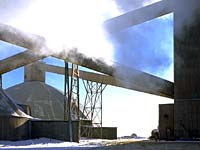
Potash - The Economic Impact for Saskatchewan
Saskatchewan's competitive advantage is the exceptional extent and quality of its ore reserves. The potash of Saskatchewan is high-grade ore lying in basically flat beds. Using highly efficient mining techniques, and due to the extent of the reserves, the province is able to have a competitive advantage in the business world. The province's industry is widely considered to have the lowest production costs in the world. The only downfall to this advantage is the cost of transporting the mineral out of the province, mainly due to the distance of the province from waterways.
Only about five per cent of the potash produced in Saskatchewan is consumed in Canada. About two-thirds of the exports go to the U.S., where Saskatchewan has approximately 70 per cent of the market. The province is also a major supplier to the large Pacific Rim offshore markets: China, Japan, Malaysia, Korea and Indonesia. All Saskatchewan producers make offshore sales through Canpotex, a Saskatoon based marketing company owned by its member companies. |

Saskatchewan is the largest potash producer in the world and accounts for about 40 per cent of world trade. Major competitors include the former Soviet Union, East Germany, West Germany, Israel, Jordan, New Brunswick and New Mexico. Under the correct market conditions, the prospects are excellent for the Saskatchewan potash industry. Higher population growth, combined with growing world income levels, will ensure that the demand for potash will increase. The world's population has doubled during the past 40 years and is now estimated at between five and six billion people. Over the past ten years, population growth has averaged 85 million people per year; in other words, the equivalent to adding the total population of the United States every four years. Coupled with this, the world's economy is continually growing, bringing with it an increased demand for higher calorie and higher protein diets supplied by more varied and higher quality food products. At the same time, the world's agricultural land base is shrinking significantly, particularly in many Asian countries, due to urbanization, industrialization, erosion and salinization.
|

These factors mean that increased agricultural productivity from this shrinking land base is essential. The need to sustain and improve soil fertility can be met by balancing the supply of the three essential plant nutrients: nitrogen, phosphorous and potassium. Potassium, in the form of potash or potassium chloride (KCl), makes plants more resistant to pests, diseases and adverse weather conditions, thereby promoting higher crop yields. The consistent application of potash fertilizers can help to ensure optimum crop yields.
|
